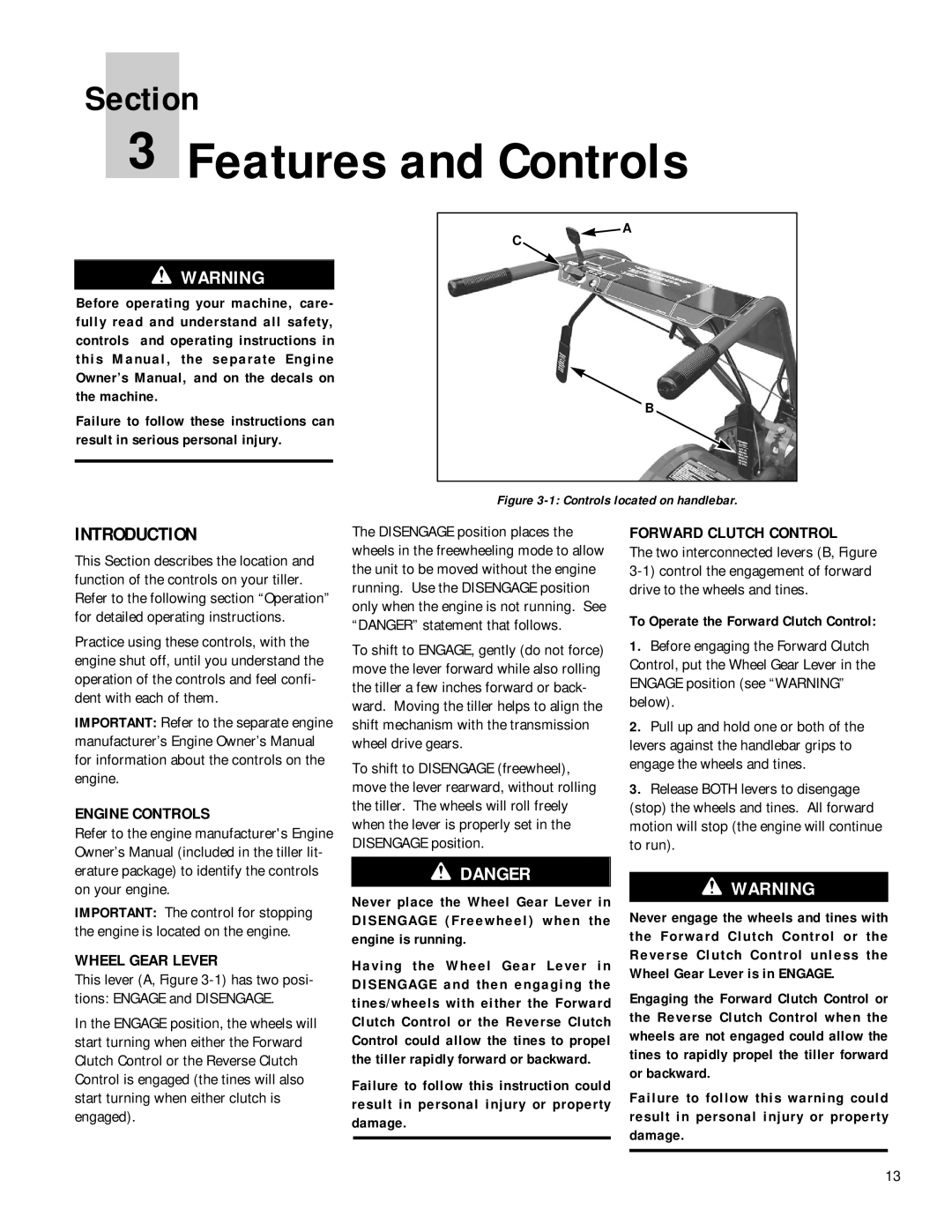
Section
3Features and Controls
WARNING
Before operating your machine, care- fully read and understand all safety, controls and operating instructions in this Manual, the separate Engine Owner’s Manual, and on the decals on the machine.
Failure to follow these instructions can result in serious personal injury.
![]() A
A
C
B
Figure 3-1: Controls located on handlebar.
INTRODUCTION
This Section describes the location and function of the controls on your tiller. Refer to the following section “Operation” for detailed operating instructions.
Practice using these controls, with the engine shut off, until you understand the operation of the controls and feel confi- dent with each of them.
IMPORTANT: Refer to the separate engine manufacturer’s Engine Owner’s Manual for information about the controls on the engine.
ENGINE CONTROLS
Refer to the engine manufacturer's Engine Owner’s Manual (included in the tiller lit-
The DISENGAGE position places the wheels in the freewheeling mode to allow the unit to be moved without the engine running. Use the DISENGAGE position only when the engine is not running. See “DANGER” statement that follows.
To shift to ENGAGE, gently (do not force) move the lever forward while also rolling the tiller a few inches forward or back- ward. Moving the tiller helps to align the shift mechanism with the transmission wheel drive gears.
To shift to DISENGAGE (freewheel), move the lever rearward, without rolling the tiller. The wheels will roll freely when the lever is properly set in the DISENGAGE position.
FORWARD CLUTCH CONTROL
The two interconnected levers (B, Figure
To Operate the Forward Clutch Control:
1.Before engaging the Forward Clutch Control, put the Wheel Gear Lever in the ENGAGE position (see “WARNING” below).
2.Pull up and hold one or both of the levers against the handlebar grips to engage the wheels and tines.
3.Release BOTH levers to disengage (stop) the wheels and tines. All forward motion will stop (the engine will continue to run).
erature package) to identify the controls on your engine.
IMPORTANT: The control for stopping the engine is located on the engine.
WHEEL GEAR LEVER
This lever (A, Figure
In the ENGAGE position, the wheels will start turning when either the Forward Clutch Control or the Reverse Clutch Control is engaged (the tines will also start turning when either clutch is engaged).
DANGER
Never place the Wheel Gear Lever in DISENGAGE (Freewheel) when the engine is running.
Having the Wheel Gear Lever in DISENGAGE and then engaging the tines/wheels with either the Forward Clutch Control or the Reverse Clutch Control could allow the tines to propel the tiller rapidly forward or backward.
Failure to follow this instruction could result in personal injury or property damage.
WARNING
Never engage the wheels and tines with the Forward Clutch Control or the Reverse Clutch Control unless the Wheel Gear Lever is in ENGAGE.
Engaging the Forward Clutch Control or the Reverse Clutch Control when the wheels are not engaged could allow the tines to rapidly propel the tiller forward or backward.
Failure to follow this warning could result in personal injury or property damage.
13
